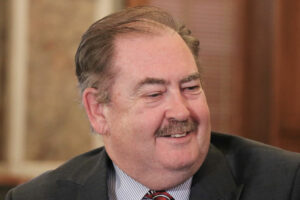Search Results

Interview of Tim Shallenburger, September 25, 2020
Interviewed by Alan Conroy
This interview with Tim Shallenburger, former Speaker and twelve-year House member is packed full of interesting anecdotes covering his philosophy of leadership, antics in the House, battles fought and won. Shallenburger was the first "conservative" Speaker following a wave of conservatives being elected beginning in the early 1990's. He candidly discusses why he ran for office in a largely Democratic district, how he moved up in the leadership and developed relationships with other legislative leaders in both House and Senate. Early in his time in the House, Shallenburger was part of a group known as the "rebels". Show More He watched other people's leadership styles and learned how to be a leader himself, first getting elected Speaker Pro Tem and then Speaker, beating Speaker Bob Miller in a "not-so-close" race. Shallenburger learned how to count votes. He doesn't see himself as having an "agenda", other than being fair as a leader. Shallenburger describes the rules changes the rebels made in the House when Jim Braden was Speaker to allow more bills to be heard or pulled out of committee. Bill Graves was Governor throughout all four years of Shallenburger' s term as Speaker. Shallenburger left the legislature to become State Treasurer. After 2010 he served as legislative liaison for Governor Brownback. Shallenburger talks openly about his relationships with numerous governors and senate leaders. The interview closes with a discussion of redistricting. Show Less

Interview of Kent Glasscock, June 11, 2021
Interviewed by Alan Conroy
As Majority Leader, and then as Kansas House Speaker, Kent Glasscock found ways to work productively with the conservative wing of the Republican caucus. The first part of the interview describes how Glasscock decided to run for office and his six campaigns.
As he moved up in leadership, the interview talks about several situations where his views as a moderate Republican clashed with the growing number of conservatives in the Republican caucus. Finally, Speaker Shallenburger called Glasscock to his office and together they made peace and subsequently worked well together. Glasscock cites the school finance bill that Show Moredealt with a capital outlay for school buildings as one of his best, most long-lasting accomplishments as well as the Confined Animal Feeding legislation. Styling himself as a true "policy wonk", Glasscock's descriptions of legislative antics in passing legislation are really interesting. This interview gives a picture of how the legislature transitioned to conservative control during his 12 years in office. Show Less

Interview of Robert (Bob) Tomlinson, August 2, 2024
Interviewed by Chris Courtwright
Chris Courtwright's interview of Bob Tomlinson, former city councilman, legislator and Assistant Insurance Commissioner is one of the longest and most complete undertaken by KOHP. The entire interview (2 hours 23 minutes) is posted here. But in addition, several shorter clips, taken from the interview, are posted below and will also be used as part of Resources for Educators. Tomlinson's interview covers his wide political experience and lessons he learned. He tells lots of funny stories about other prominent politicians of the era and shares his political philosophy and technics for "vote-counting" for Speaker Glasscock and Show Moreothers. He also comments on the public policy issues of the day, including health insurance mandates, Medicaid expansion, school vouchers, the need for full funding for special education.
Highlights -- short excerpts from the interview
